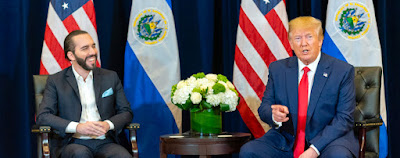One year and counting under El Salvador's State of Exception

March 27 marks one year since El Salvador's Legislative Assembly passed an emergency State of Exception at the behest of president Nayib Bukele. As this one year anniversary is reached, much is being published about the State of Exception: War on Gangs Forges New El Salvador. But the Price is Steep , Megan Janetsky and Fernanda Pesce, writing for the Associated Press offer a detailed look at the reality on the streets of El Salvador today, and the harsh measures implemented over the past year. Their reporting and the photos which accompany the story illustrate the opening up happening in communities formerly controlled by gangs, but also describe the price paid, and continuing to be paid under the current regime. Countering El Salvador’s Democratic Backsliding . Tamara Taraciuk Broner of Human Rights Watch and Noah Bullock of Cristosal, writing in Americas Quarterly, call on regional leaders to counteract the decline of the rule of law in El Salvador. They ...





